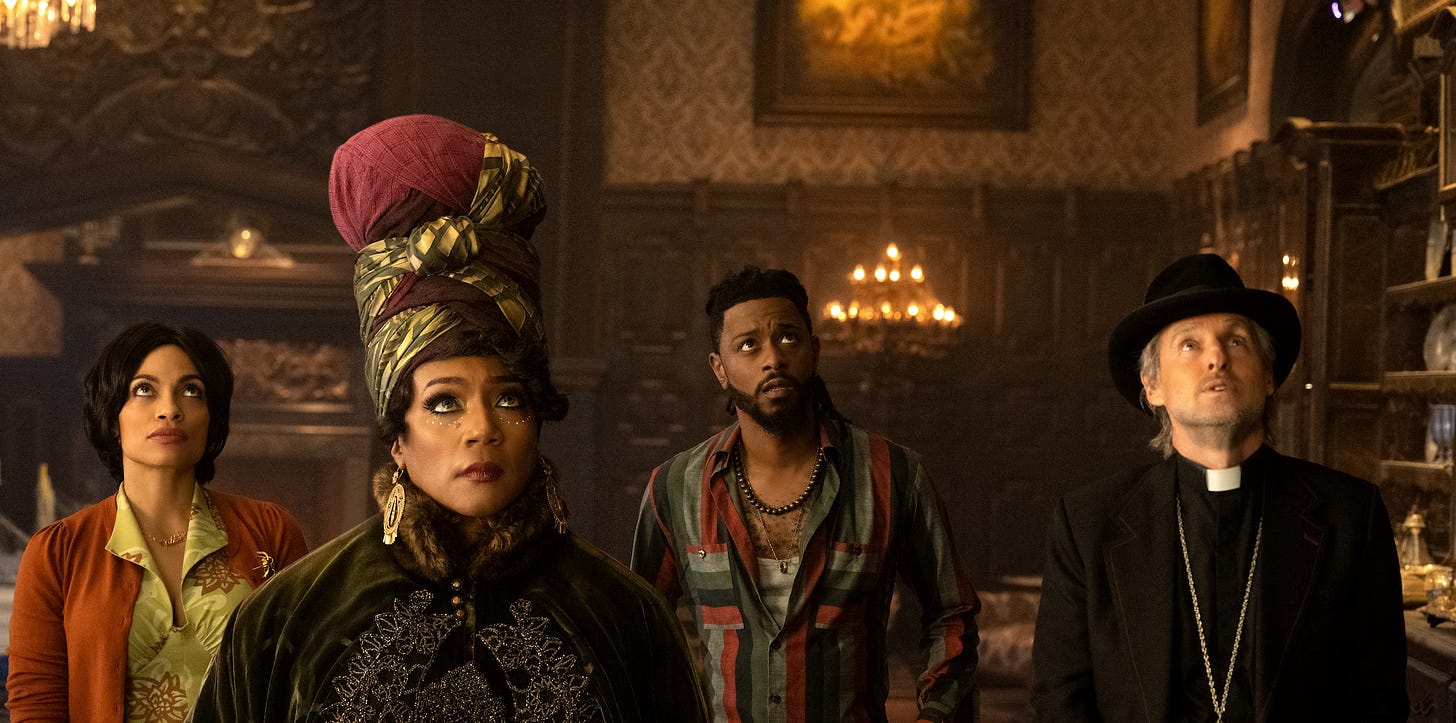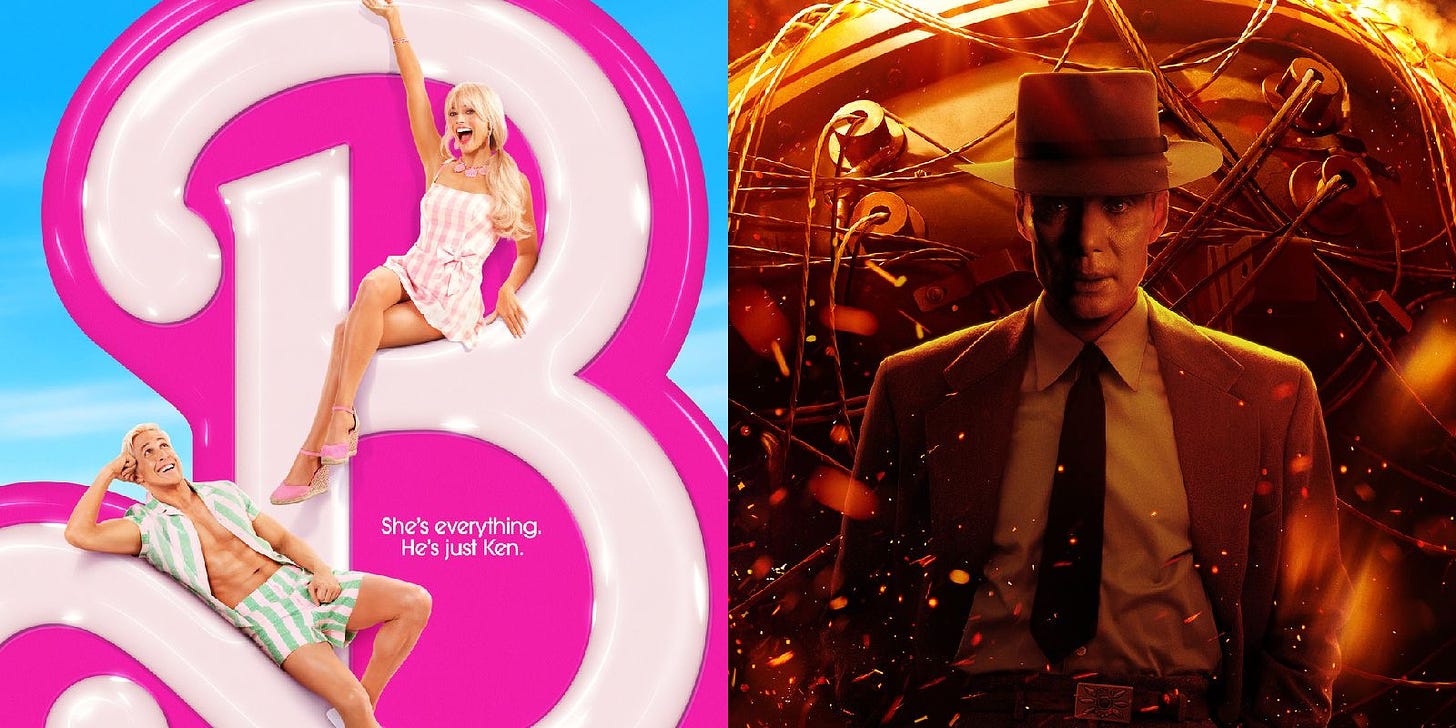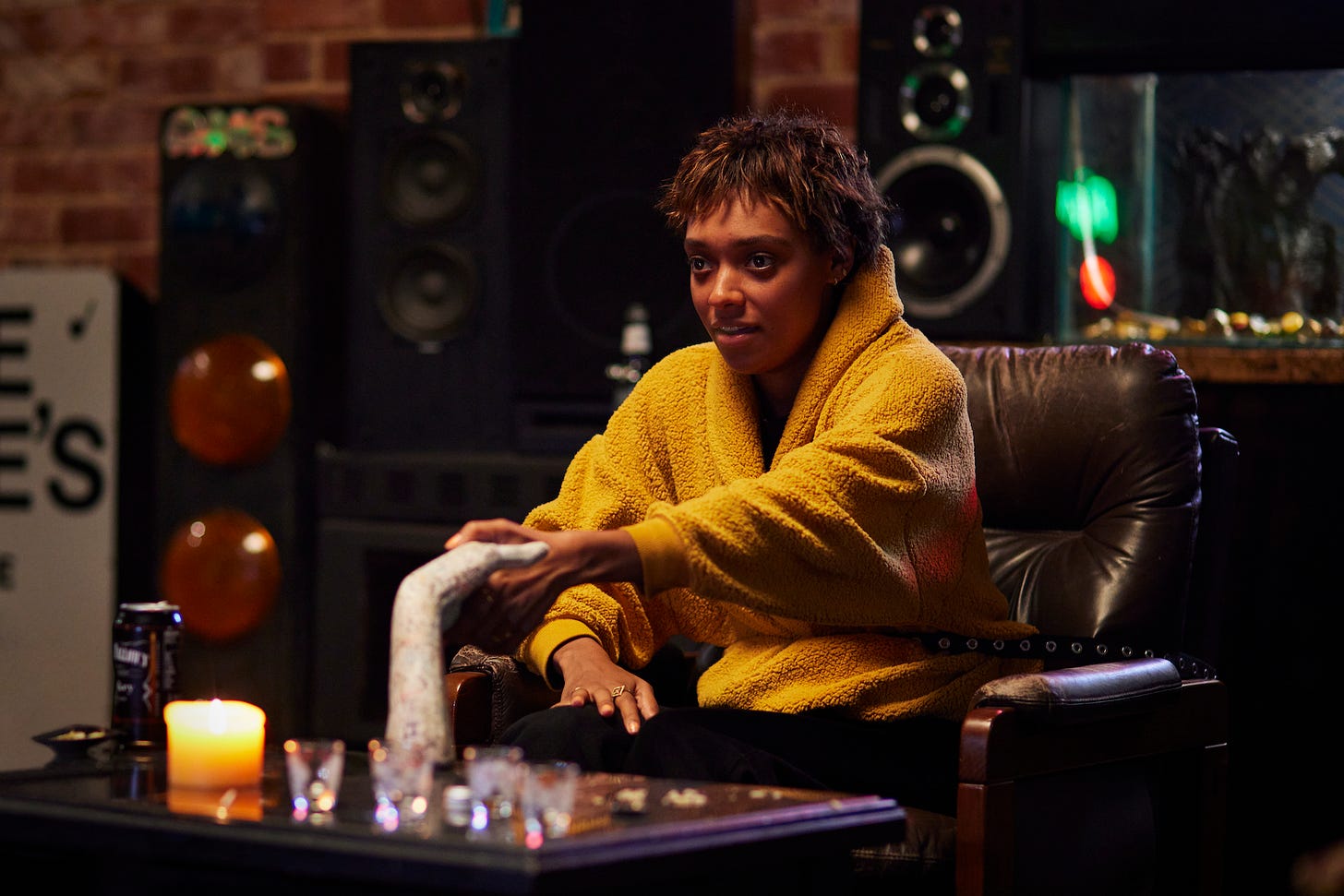Midweek Update: Life After Sequels
Studios need to confront the box office reality of "Barbenheimer."
Barbie was projected to earn $100 million on its opening weekend. Oppenheimer was projected to earn $50 million. Both films (billed together as “Barbenheimer” for opening on the same date) blew past those projections, with Barbie pulling in $155 million and Oppenheimer earning $80 million. This was in a summer where tentpoles either kept falling short of expectations (Indiana Jones and the Dial of Destiny, Mission: Impossible - Dead Reckoning, Part One) or bombing outright (The Flash). This also came on the heels of a spring where consistently smaller films with intriguing premises (M3GAN, Cocaine Bear) proved to be box office hits.
Although studios have always pursued sequels in the wake of hits, since the 2010s companies have gorged themselves at the trough of franchise IPs at the expense of all else. Relying on IP is nothing new, but in the age of the Marvel Cinematic Universe, studios have come to rely on pre-sold, pre-packaged stories instead of forging ahead with anything remotely new. Even a typical sequel (like a third National Treasure movie) wasn’t deemed good enough in an age where studios only wanted to green light the biggest properties and give them prequels or sequels or any way of expanding upon stories people already knew.
Of course, the problem here is that at some point people start wondering if there’s any worthwhile story left to tell, and those who weren’t invested now feel like the hill is too high to climb. Across the Spider-Verse benefitted from only needing to see Into the Spider-Verse beforehand (if you have a bunch of Spider-Man knowledge going in that’s great, but you don’t need it to know the characters and their world). Guardians of the Galaxy, Vol. 3, by virtue of the first two movies, signaled that the third installment, while part of the Marvel Cinematic Universe, was again a standalone story where you didn’t to see a TV show or long stretch of movies to feel invested. It also helped that these movies were, you know, good (as opposed to the smash-and-grab of Ant-Man and the Wasp: Quantumania, which tanked after its opening weekend).
But at this point, are we really surprised that audiences may feel reluctant to see decades-old franchises churning out new installments? I like Harrison Ford. I like Indiana Jones. I’m not sure I needed to see a fifth Indiana Jones movies. I like Tom Cruise. I like the Mission: Impossible movies. But I can understand the reluctance to rush out to see the seventh one, which already bills itself as only half a story. If you’re a casual moviegoer who doesn’t go to see every new release, I can’t really blame you for not wanting to spend $20 to see half a story that’s also the seventh movie of a series.
Barbie and Oppenheimer may have complemented each other through their juxtaposition (the colorful and comic world of Barbie next to the serious biopic of Oppenheimer), but they were also inviting because you could just see a movie without doing homework. Barbie has been around since 1959. Even if you’ve never played with Barbie, you know what Barbie is. Oppenheimer is credited as the father of the atomic bomb. Even if you don’t know who Oppenheimer is, you know what an atomic bomb is. I don’t mean to undermine the marketing work the teams at Warner Bros. and Universal did, respectively, but they also didn’t have to worry about catching people up. There was no homework before seeing these movies.
The studios also decided to trust their artists. Greta Gerwig and Christopher Nolan are both Oscar-nominated writers and directors, and they had clear visions for what they wanted to accomplish with their movies. They weren’t hired hands being funneled into some franchise machine and told to turn out a product. They both had something they wanted to say with their respective movies, had the artistic temperament and talent to put it together in a big feature (although one that didn’t cost $300 million like the latest Indiana Jones and Mission: Impossible), and then trust that the studio could generate interest with the public.
It also helps that we can see the success with our own eyes. You only had to go to the movies this past weekend (as I did with my wife) to see people dressed in pink or in big groups. Netflix can tout big streaming numbers for a movie, but who cares? We never know what a flop looks like since streamers only release positive numbers, and in any case, there’s not much excitement of seeing a movie at the same time as other people when we’re all sequestered in our homes. I’ve heard the movie Netflix release this past weekend, They Cloned Tyrone, is quite good, but I don’t know the metrics that could make it a success. All that information is internal to Netflix, and they guard it closely, which is their right, but it also makes it difficult to see the film as a success on the same level as Barbie and Oppenheimer.
Maybe this is just me celebrating my own prior beliefs, but I do believe the weekend success of Barbie and Oppenheimer backs me up when I say that audiences are cooling on the demands that franchises make of them. It’s one thing to follow an event all the way up to Avengers: Endgame, but that’s not sustainable, and at some point, people want greater genre diversity. It should be noted that neither Barbie nor Oppenheimer is an action movie, which is what studios have been throwing most of their money at. Second, Netflix only seems to win when the studios kneecap themselves. We all talked about Tiger King because we were locked inside with nothing else to watch. On a level playing field, streaming movies fail to generate the same level of excitement.
If I were an optimist, I would say that the success of Barbie and Oppenheimer was a clear sign to the major studios that they need to pivot away from the approach of the last 10-15 years. But I am not an optimist, and we’re in the middle of a strike that shows no signs of abating any time soon. I fear that the studios will stubbornly sacrifice the remainder of 2023 in the hopes of securing a deal with the unions and thus leave Netflix to run rampant and thus “win” not by virtue of its films, but because no one else is on the field to compete. When the studios come back, they’ll double down on their biggest properties to try and make up ground with investors instead of making the argument that the films coming to theaters aren’t overpriced sequels, but films from exciting filmmakers that will get people talking.
Recommendations
Meta’s Threads is very bad. Almost a month after launching, they finally added a chronological feed this past week, but I fear the damage is already done. A large part of the problem, as Ryan Broderick points out in the Substack article below, is that Threads has zero personality. The notion that you could drive any kind of consistent engagement when only brands are participating is like expecting someone to watch a TV channel that’s only advertisements. It is, simply put, not fun. Bluesky isn’t without its problems, but at least there are people there trying to be funny and interesting, which is more than I can say for Threads.
Last week I recommended a Russell Crowe movie on 4K and this week I’m recommending a Russell Crowe movie on 4K. This time it’s Ridley Scott’s American Gangster. A terrific two-hander of Washington playing a drug kingpin and Crowe as the detective tasked with bringing him to justice, it’s interesting to see how Crowe and Washington’s careers have continued to intersect. They first co-starred in 1995’s Virtuosity, which is a nice slice of 90s action/sci-fi cheese with Crowe basically playing The Joker. Then they famously went head-to-head in the 2002 Oscars when they were both nominated for Best Actor (Crowe for A Beautiful Mind and Washington for Training Day; Washington won), and then squared off in this underrated crime thriller. Washington now co-stars in the upcoming Gladiator sequel, which Crowe is not in (for obvious reasons if you’ve seen the first Gladiator).
What I’m Watching

Justin Simien’s Haunted Mansion took all the right lessons from 2003’s Pirates of the Caribbean: The Curse of the Black Pearl. It’s not as good as that movie (which is a high bar to clear), but it understands that the key to turning a theme park ride into a movie has nothing to do with big CGI set pieces (something the Pirates movies lost sight of in the fourth and fifth installments). It’s about using tactile settings supplemented by CGI, but always foregrounding the action with colorful characters with an interesting story.
Haunted Mansion has a pretty straightforward premise—an eclectic group comes together to try and help a mother and son remove the spirits that inhabit their spooky mansion. What makes it work is that you care about all the characters. The foreground is a depressed scientist (LaKeith Stanfield) grieving over the loss of his wife. For all the kooky ghost shenanigans (and Haunted Mansion feels designed to be an entry into horror for kids, so it can scare them without scarring them), the film is about grief and the difficulty of letting go. Ghosts are scary, but they’re also appealing because they provide the idea that death won’t sever our relationships.
The film is far better than the trailers led me to believe, and there’s not a weak link in the cast. I also think that it’s pretty great we have Stanfield leading a summer tentpole. He’s one of the most exciting actors working today, and he has no trouble with the emotional and comic beats the film requires of him.
If you’d like to do another ghosts and grief movie this weekend, you can also check out the very-much-not-for-kids horror film Talk to Me. The debut feature from Australian directors Danny and Michael Philippou, the film is about a young woman (Sophia Wilde) still reeling from her mother’s apparent suicide. She’s seen through social media that an acquaintance has a creepy hand that allows someone to not only talk to the dead but also be possessed by them.
Parents, please talk to your kids about not messing with the spirit realm for likes on social media. If someone wants you to be possessed by the dead, they’re not really your friend.
Talk to Me is a terrific bit of horror that always earns its scares. The Philippous know how to build tension and come up with some truly frightening imagery. While the film proudly wears its influences (Flatliners, It Follows, and Evil Dead to name a few), it also feels like it’s building on those influences and adding to the conversation rather than feeling like a knock-off. I certainly can’t wait to see what the Philippous do next, and I wouldn’t be surprised if Talk to Me became a word-of-mouth horror hit.
What I’m Reading
I finished reading John Carreyrou’s Bad Blood last night, and while the book notes that taking Silicon Valley’s fake-it-until-you-make-it approach to medicine is disturbing, I was also struck by how poorly Theranos was run simply from a management standpoint. Even if their product hadn’t been completely fake, Elizabeth Holmes and Sunny Balwani were terrible managers. They fostered a culture of fear and paranoia. Sure, part of the overbearing security and compartmentalization was to make sure employees didn’t know that the Edison and miniLab were fake, but Holmes and Balwani also seemed to adopt an all-too-common management style where tyranny and cruelty are perceived as strength. You can demand the best from people and still treat them well. In my experience, people seem to do better work when they know they’re valued rather than disposable.
In other reads:
The IHOP Kingpin vs. the American Revolutionaries by Reeves Wiedeman [Curbed] - This is just a fun, low-stakes story with some fantastic writing by Wiedeman. If you’re not hooked after the lede, you probably won’t care about what comes after. It’s a silly little feud, and as one observer notes, “They’re all full of shit,” he said. “It’s just a matter of who’s more full of shit than the other.”
How Cringe Screenshots Killed Dating Apps by Miles Klee [Rolling Stone] - My wife and I met through online dating, but it feels like we were using these apps before things got real sour, real fast. I used to think that at least dating apps offered the possibility of being on equal footing in the sense that you ostensibly join a dating app to, you know, date (as opposed to going to a bar and maybe you’re there to meet someone but you might also just want to grab a drink with friends and not be bothered). But as this article points out, in the vapid currency of online interactions, any potential misstep could be fodder for someone’s real passion, which is amassing likes and comments. I do think that a lot of people (mainly men) on dating apps are awful, but I also think that if you’re entering into that space in bad faith, it only makes a difficult process even more difficult.
How Shady Is the 'Sound of Freedom' Box Office? by Dustin Rowles [Pajiba] - You may have seen over the weekend that Sound of Freedom grossed more than Mission: Impossible - Dead Reckoning, Part One. Wow! But if you look closer, you’ll note that Sound of Freedom is backed by some sketchy figures who are adjacent to some even sketchier people. The charitable reading is that people are (rightly) disgusted by child sex trafficking, and Sound of Freedom draws attention to that issue. But that reading would ignore a lot of surrounding context, which Rowles explains in the article.
What I’m Hearing
I’m caught up on Serial’s new series, “The Retrievals”. The show examines the 2020 case of women who were undergoing the process of IVF retrieval, but the fentanyl they were supposed to receive during the procedure had been swapped out for saline by a drug-addicted nurse who stole the fentanyl for personal use. While it’s disturbing to hear how these women were effectively tortured, what’s far more disturbing is the larger implication the series is exploring: whose pain matters? That exploration starts in the first episode with a look at how women’s pain is consistently minimized and ignored (women who were crying out in agony during in the procedure were dismissed as “hysterical” and it wasn’t until someone noticed a loose cap on a fentanyl vial that anyone even suspected anything; just think how much sooner the clinic could have stopped this crime if they had just, you know, listened to the women), but then expands to examine the pain of addiction and ultimately who is deemed worthy of empathy and consideration in our society. Although it’s a difficult listen, I think it’s a far better show than “The Coldest Case in Laramie.”
I have also been hearing myself! First up, The Morning X, which is the morning show for Atlanta’s alternative station, 99X, had me on again to talk movies. I was happy to talk about Barbenheimer before the films opened, and I’m always happy to chat with Barnes and Leslie (especially since I grew up listening to The Morning X on my way to school every morning).
I was also invited to join the good gents of The Kingcast, Scott Wampler and Eric Vespe, for a bonus episode where we discussed The Tull Massacre from Stephen King’s The Gunslinger, and what it means to try and adapt King’s stories from page to screen. The episode is available only for Patreon members, and you should subscribe because Scott and Eric are the best.
What I’m Playing
I could beat Tears of the Kingdom right now if I wanted. I have enough hearts, weapons, stamina wheels, etc. But you see, when it comes to video games, I am not a sensible person. For example, a sensible person would not plumb the Depths just so they could recover the specific set of clothing that Link wore in Ocarina of Time. What did I do? Reader…







